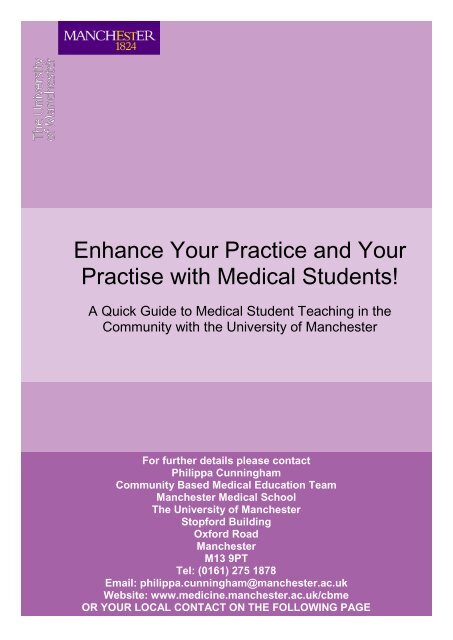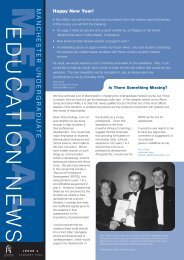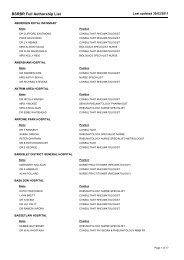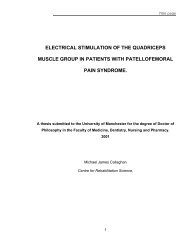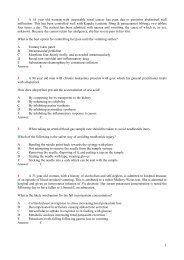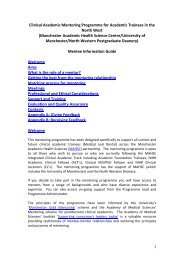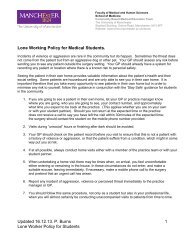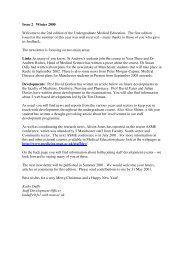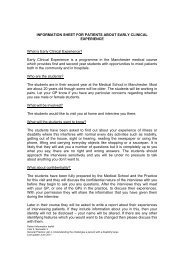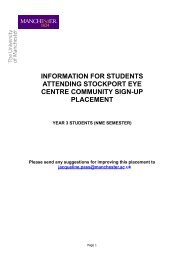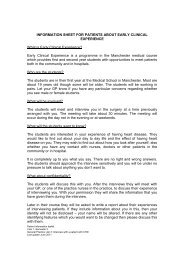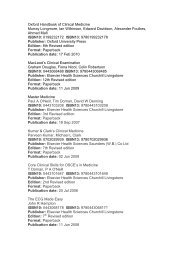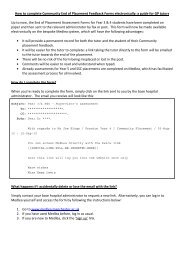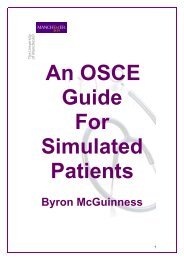Why Host Medical Students - School of Medicine - The University of ...
Why Host Medical Students - School of Medicine - The University of ...
Why Host Medical Students - School of Medicine - The University of ...
Create successful ePaper yourself
Turn your PDF publications into a flip-book with our unique Google optimized e-Paper software.
Enhance Your Practice and Your<br />
Practise with <strong>Medical</strong> <strong>Students</strong>!<br />
A Quick Guide to <strong>Medical</strong> Student Teaching in the<br />
Community with the <strong>University</strong> <strong>of</strong> Manchester<br />
For further details please contact<br />
Philippa Cunningham<br />
Community Based <strong>Medical</strong> Education Team<br />
Manchester <strong>Medical</strong> <strong>School</strong><br />
<strong>The</strong> <strong>University</strong> <strong>of</strong> Manchester<br />
Stopford Building<br />
Oxford Road<br />
Manchester<br />
M13 9PT<br />
Tel: (0161) 275 1878<br />
Email: philippa.cunningham@manchester.ac.uk<br />
Website: www.medicine.manchester.ac.uk/cbme<br />
OR YOUR LOCAL CONTACT ON THE FOLLOWING PAGE
Local Contacts / GP Education Facilitators<br />
Health Education Zone<br />
(HEZ)<br />
Base Hospital Contact<br />
Associated GP Facilitators<br />
Lancashire Teaching Hospitals NHS Foundation Trust HEZ<br />
Associate Community Dean<br />
Dr Neil Smith<br />
neil.smith-2@manchester.ac.uk<br />
Ann Pearmain<br />
Dr Mike Powell (Blackpool, Fylde and Wyre)<br />
(01772) 528 134<br />
michael.powell@manchester.ac.uk<br />
ann.pearmain@lthtr.nhs.uk Dr Steve Cottam (Blackpool, Fylde and Wyre)<br />
stevecottam2001@yahoo.co.uk<br />
Dr Janine Riley (Blackpool Fylde and Wyre)<br />
capecod47@btinternet.com<br />
Dr Sumantra Mukerji (Preston and Longridge)<br />
sumantra.mukerji@manchester.ac.uk<br />
Dr Paul Blake (Chorley and South Ribble)<br />
paul.blake@manchester.ac.uk<br />
Dr David Webborn (Burnley, Pendle and<br />
Rossendale)<br />
david.webborn@nhs.net<br />
Dr Neil Smith (Blackburn with Darwen)<br />
neil.smith-2@manchester.ac.uk<br />
<strong>University</strong> Hospital <strong>of</strong> South Manchester NHS Foundation Trust HEZ<br />
Associate Community Dean<br />
Dr Judy Ream<br />
judy.ream@manchester.ac.uk<br />
Elaine Abbott<br />
Dr Ravi Arya (South Manchester)<br />
(0161) 291 5787<br />
raviarya50@hotmail.com<br />
elaine.abbott@manchester.ac. Dr John Kelly (South Trafford)<br />
uk<br />
jkelly@nhs.net<br />
Dr Chris Barratt (Central Cheshire)<br />
christopher.barratt@manchester.ac.uk<br />
Dr David Riley (Stockport)<br />
david.riley-2@manchester.ac.uk<br />
Dr Hayley Willacy (East Cheshire)<br />
hayley.willacy@manchester.ac.uk<br />
2
Salford Royal NHS Foundation Trust HEZ<br />
Julie Smith<br />
Dr Arthur Finke (Salford)<br />
(0161) 206 3179<br />
arthur.finke@manchester.ac.uk<br />
julie.smith@srft.nhs.uk Dr J Kirby (Bolton)<br />
angus.kirby@nhs.net<br />
Dr Bill Russell (Ashton, Wigan and Leigh)<br />
bill.russell@manchester.ac.uk<br />
Dr Jeff Schryer (Bury)<br />
jeffrey.schryer@manchester.ac.uk<br />
Central Manchester <strong>University</strong> Hospitals NHS Foundation Trust HEZ<br />
Lisa Williams<br />
Dr Andrew Thornley (Tameside & Glossop)<br />
(0161) 276 4964<br />
andrew.thornley@manchester.ac.uk<br />
lisa.williams2@cmft.nhs.uk Dr Enam Haque (Central Manchester)<br />
enam.haque@manchester.ac.uk<br />
Dr Raj Khiroya (Heywood, Middleton,<br />
Rochdale and Oldham)<br />
raj.khiroya@manchester.ac.uk<br />
Dr Peter Dixon (North Manchester)<br />
peter.dixon@manchester.ac.uk<br />
3
• Fun<br />
<strong>Why</strong> have <strong>Medical</strong> <strong>Students</strong> in the Practice<br />
• Interesting, allows you to give something back<br />
• Challenging, a learning opportunity for you<br />
• Helps your appraisal<br />
• Helps in your personal development<br />
• <strong>Students</strong> can be useful e.g. audits<br />
• Prevents ‘burnout’, promotes fulfilment.<br />
• You get paid (see the website for payment details<br />
www.medicine.manchester.ac.uk/cbme/feeguide)<br />
• Grow your own future GPs – recruitment<br />
• Enhances status <strong>of</strong> general practice<br />
• Enhances perception <strong>of</strong> practice by patients, staff and future potential<br />
partners.<br />
• Training is provided (see the training and events page on the website)<br />
Early Clinical Experience<br />
In years one and two: An introduction to the primary care clinical setting; putting<br />
communication skills into practice.<br />
Third YearThird Year<br />
Developing pr<strong>of</strong>iciency in history taking, clinical skills and forming differential<br />
diagnoses<br />
Fourth YearFourth Year<br />
History taking, examination, differential diagnosis and learning how to manage<br />
different conditions and presentations<br />
Student Selected Components ( SSCs) and Project Options<br />
A student selected area <strong>of</strong> healthcare to investigate in detail.<br />
Fifth Year – <strong>The</strong> GP Apprentice<br />
Putting it all together, developing competency and pr<strong>of</strong>iciency, learning to critically<br />
evaluate one’s own care and that <strong>of</strong> others; preparing for practice<br />
Learning should always be active and not just observation!<br />
4
Early Clinical Experience (Years One and Two)<br />
<strong>Students</strong> attend practices on six half days scattered over their first two years at<br />
medical school. You can opt to do just one half day or as many as you wish..<br />
<strong>The</strong>re is a menu <strong>of</strong> dates for you to choose from and information about your<br />
availability will be requested well in advance. <strong>The</strong> dates will be matched to a<br />
specific activity (see information about visits below).<br />
You can take one pair <strong>of</strong> students or up to a maximum <strong>of</strong> 4 pairs on any half day.<br />
Please indicate on your availability form if you are able to take more than one pair<br />
<strong>of</strong> students.<br />
Taking early experience students should not prevent you taking students from<br />
other years. No additional space is required in the surgery, and training is<br />
available (see the training and events page on the website).<br />
You will need to arrange the following:<br />
Visit 1: An orientation to your practice plus opportunities for students to spend<br />
some time with different members <strong>of</strong> staff to learn about their roles within the<br />
team.<br />
A pregnant patient (or a new parent) who is willing to be interviewed by the<br />
students at the surgery.<br />
Visit 2: Allow students to sit in a surgery to see, and take histories from patients<br />
who have presented acutely / have ‘book on the day’ appointments.<br />
Visit 3: Allow students to sit in clinic with a Practice Nurse to observe and discuss<br />
her role in chronic disease management within the practice.<br />
A patient with CHD who is willing to be interviewed by the students at the surgery.<br />
Visit 4: A patient with a chronic disability who is willing to be interviewed by the<br />
students at home.<br />
Visit 5: <strong>Students</strong> each interview a patient with diabetes.<br />
Visit 6: For you to observe each student as they interview a patient with an acute<br />
problem and provide them with feedback on their communication skills.<br />
Learning should always be active, not just observing, involving students in taking<br />
histories and examining patients as much as possible.<br />
5
Early Clinical Experience<br />
Overall aim: To provide the students with authentic human contact in the primary<br />
care setting that enhances learning <strong>of</strong> health, illness or disease and the role <strong>of</strong> the<br />
health pr<strong>of</strong>essional.<br />
<strong>The</strong> particular activities included in each visit have been designed to integrate with<br />
the students other learning, including knowledge and skills, particularly<br />
communication skills, and promote their pr<strong>of</strong>essional development.<br />
For each <strong>of</strong> the visits it is suggested that a GP, or other member <strong>of</strong> the practice<br />
team, oversees the students’ activities. This should include briefing the students at<br />
the start <strong>of</strong> the visit so that they, and you, are clear about what they are supposed<br />
to be doing. <strong>The</strong>y should have a debrief meeting at the end <strong>of</strong> the visit to help<br />
them think about what they have learned.<br />
<strong>The</strong> first visit is for students to learn something about how general practice<br />
works. <strong>The</strong>y need some time allocated to meet and sit with different members <strong>of</strong><br />
the team, e.g. receptionist, practice manager, GP, practice nurse etc. You<br />
shouldn’t need to lengthen surgeries for this as on this occasion students are<br />
there simply to observe. Also during this visit you need to arrange for a pregnant<br />
woman, or new parent, to come into the surgery to be interviewed by the<br />
students. <strong>The</strong> patient will need to be briefed to expect to be in the surgery for up<br />
to an hour.<br />
<strong>The</strong> second visit requires the students to sit in on a surgery with you, preferably<br />
an acute surgery, or one which is booked on the day. (<strong>Students</strong> need to see and<br />
talk to patients with acute problems).<br />
<strong>The</strong> third visit requires the students to sit in a clinic with your Practice Nurse.<br />
<strong>The</strong>y need to see her dealing with patients with chronic diseases. Also during this<br />
visit you need to arrange for a patient with CHD to come into the surgery to be<br />
interviewed by the students.<br />
<strong>The</strong> fourth visit requires you to arrange for the students to visit a patient with a<br />
chronic disability in their own home, e.g. patients with multiple sclerosis,<br />
rheumatoid arthritis, osteoarthritis, learning disability, patients who are deaf, visual<br />
impairment, stroke, severe COPD etc.<br />
<strong>The</strong> fifth visit requires each student to interview a patient with diabetes. <strong>The</strong><br />
students watch each other and feedback on their communication skills.<br />
<strong>The</strong> sixth visit requires each student needs to be observed by you taking a<br />
history from a patient in an acute surgery. You will provide them with feedback on<br />
their communication skills. Visits 5 and 6 may be done on one full day.<br />
6
Heart,<br />
Third YearThird Year<br />
Lungs and<br />
Blood<br />
<strong>Students</strong> attend the practice for a fixed day each<br />
week for (usually) 14 weeks in each semester, i.e.<br />
28 days per year (in some areas this is done in a Nutrition,<br />
continuous block <strong>of</strong> varying length). <strong>The</strong> students Metabolism<br />
can attend the practice on a day you choose but the and<br />
main demand is for Tuesdays, Thursdays and Excretion<br />
Fridays for most areas. A pair will normally attend<br />
for 6 or 7 weeks then a second pair for the following 6 or 7 weeks.<br />
Nutrition,<br />
Metabolism<br />
and<br />
Excretion<br />
Heart,<br />
Lungs and<br />
Blood<br />
During NME students also go to alternate placements with hospices, podiatrists,<br />
pharmacists, opticians, dermatologists and small group work with GPs. Each pair<br />
therefore spends 7 days with you and 7 days on alternate placements during<br />
NME.<br />
Each time students attend your surgery, they should be active participants in at<br />
least 8 surgeries (NOT just sitting in and observing, they need to sit in the hot<br />
seat, interview patients on their own, examine them, propose differential<br />
diagnoses and management plans etc.!) Surgeries need at least 30% additional<br />
time or 30% reduction in patients.<br />
<strong>The</strong> course relates closely to what is being covered in students’ PBL sessions.<br />
<strong>Students</strong> are learning medicine in a community setting; they are not learning<br />
‘general practice’ at this stage.<br />
<strong>Students</strong> attend the practice in pairs for full days. <strong>The</strong>y should have no other<br />
hospital commitments on their community days.<br />
Each week students have specific objectives related to their PBL sessions, and<br />
particular types <strong>of</strong> cases to see. <strong>The</strong>re is clear guidance on the areas which you<br />
should aim to cover each week and the types <strong>of</strong> patient students will benefit from<br />
seeing are listed in your full handbook.<br />
<strong>The</strong>se follow a set order which whenever possible should not be varied.<br />
<strong>The</strong> first session with students requires the careful planning <strong>of</strong> what cases need to<br />
be organised (this might be in the surgery, at the patients home or another<br />
community location)<br />
We will provide training for you so you know what to do (see the training and<br />
events page on the website).<br />
Learning should always be active and not just observing.<br />
7
Third YearThird Year<br />
Third Year <strong>Students</strong> attend for one day a week for<br />
two blocks <strong>of</strong> 14 weeks (in some areas this is done<br />
in a continuous block <strong>of</strong> varying length). Your<br />
students will do one <strong>of</strong> ‘Nutrition, Metabolism and<br />
Excretion’ (NME) or ‘Heart Lungs and Blood’ (HLB)<br />
in each semester.<br />
<strong>The</strong>re are only ever two students in your practice per<br />
Heart,<br />
Lungs and<br />
Blood<br />
Nutrition,<br />
Metabolism<br />
and<br />
excretion<br />
Nutrition,<br />
Metabolism<br />
and<br />
excretion<br />
Heart,<br />
Lungs and<br />
Blood<br />
week (unless you have volunteered for more). <strong>Students</strong> change over every 7<br />
weeks in NME and HLB. <strong>Students</strong> in NME spend half their time in general<br />
practice and half their time on alternate placements in the community related to<br />
NME<br />
It is possible to have more than one pair on one day, or to have a pair on several<br />
days <strong>of</strong> the week. Just ask!<br />
<strong>The</strong> course is delivered in a specific order. Please follow this, otherwise students<br />
lose the course integration and will end up studying one subject in PBL and<br />
hospital and another in the community. <strong>Students</strong> will be able to advise you which<br />
case they need for the following week.<br />
<strong>Students</strong> spend full days with you. This doesn’t have to be all day in surgery but<br />
should include at least one surgery session per day where students are seeing<br />
some patients, taking histories, presenting their histories, having their clinical and<br />
communication skills observed, forming differential diagnoses and developing<br />
management plans.<br />
In addition to active surgery sessions, some examples <strong>of</strong> other activities which<br />
students may be involved in are listed below (all with supervision):<br />
• Induction to the practice.<br />
• Planning learning for the attachment, examining the needs <strong>of</strong> students and how these<br />
might best be met by the practice.<br />
• Evaluating students’ performance.<br />
• Helping students prepare for examinations.<br />
• Student-led tutorials to meet student learning objectives.<br />
• Running chronic disease management sessions with practice nurse.<br />
• Attending baby clinics, giving vaccinations.<br />
• Taking blood from patients.<br />
• Reviewing incoming pathology results and proposing actions.<br />
• Reviewing repeat prescriptions.<br />
• Involvement in audit projects within the practice.<br />
• Seeing their case <strong>of</strong> the week at home or in the surgery.<br />
• Accompanying you on home visits.<br />
• Medication reviews.<br />
• Spending time with members <strong>of</strong> the extended team, e.g. health visiting and district<br />
nursing teams.<br />
8
Fourth YearFourth Year<br />
<strong>Students</strong> attend the practice for a fixed day each<br />
week for 14 weeks in semester 1 and 14 weeks in<br />
semester 2, i.e. 28 days per year. <strong>The</strong> students can<br />
attend the practice on a day you choose. <strong>The</strong><br />
greatest demand is for Monday community<br />
attachments for Mind and Movement.<br />
Mind and<br />
Movement<br />
Families<br />
and<br />
Children<br />
Families<br />
and<br />
Children<br />
Mind and<br />
Movement<br />
In each 14 week block students should be active<br />
participants in ‘teaching’ surgeries (NOT just sitting in and observing; they need<br />
to sit in the hot seat, interview patients on their own, examine them, propose<br />
differential diagnoses and management plans etc.!) Surgeries will need at least<br />
30% additional time or 30% reduction in patient numbers.<br />
<strong>The</strong> course relates closely to what is being covered in students PBL sessions. For<br />
Families and Children there is one main PBL case each week while in the new<br />
revised Mind and Movement there are several PBL cases related to the same<br />
subject area each week and students also receive supporting lectures and other<br />
on line resources.<br />
<strong>Students</strong> attend the practice in pairs for full days. <strong>The</strong>y should have no other<br />
hospital commitments on their community days.<br />
Each week students have specific objectives related to their PBL sessions, and<br />
particular types <strong>of</strong> cases to see. <strong>The</strong>re is clear guidance on the areas which you<br />
should aim to cover each week and the types <strong>of</strong> patient students will benefit from<br />
seeing during each <strong>of</strong> the modules are listed in your full handbook.<br />
<strong>The</strong>se follow a set order which should not be varied; students will be able to<br />
advise you at which point they are starting the cycle and what case they will need<br />
for the following week.<br />
<strong>The</strong> first session with students requires the careful planning <strong>of</strong> what cases need to<br />
be organised (this might be in the surgery, at the patients home or another<br />
community location)<br />
We will provide training for you so you know what to do (see the training and<br />
events page on the website).<br />
Learning should always be active and not just observing.<br />
9
Fourth YearFourth Year<br />
Fourth Year <strong>Students</strong> attend for one day a week for<br />
two blocks <strong>of</strong> 14 weeks. Your students will do one<br />
<strong>of</strong> either Families and Children (F & C) and Mind<br />
and Movement (MM) in each semester.<br />
Mind and<br />
Movement<br />
Families<br />
and<br />
Children<br />
Families<br />
and<br />
Children<br />
Mind and<br />
Movement<br />
<strong>The</strong> course is delivered in a specific order which it is<br />
important you stick to. Otherwise students lose the<br />
course integration and will end up studying one<br />
subject in PBL and hospital and another in the community. It is much better for<br />
their learning if they study the same subject from different angles at the same time<br />
in PBL, community and hospital.<br />
When student numbers exceed placements then students attend practices<br />
alternate weeks, i.e. two pairs attend a practice for 7 weeks each. (Note: there<br />
are only ever two students in your practice in any one week.) It is possible to take<br />
a greater number <strong>of</strong> students e.g. by having more than one pair on one day, or by<br />
having a pair on several days <strong>of</strong> the week. Just ask!<br />
<strong>Students</strong> spend full days with you. This doesn’t have to be all day in surgery but<br />
should aim to include one surgery session per day where students are seeing<br />
some patients, taking histories, presenting their histories, having their clinical and<br />
communication skills observed, forming differential diagnoses and developing<br />
management plans.<br />
Examples <strong>of</strong> other activities which students may be involved in are listed below (all<br />
with supervision):<br />
• Induction to the practice.<br />
• Planning learning for the attachment, examining the needs <strong>of</strong> students and how these<br />
might best be met by the practice.<br />
• Evaluating students’ performance.<br />
• Helping students prepare for examinations.<br />
• Student-led tutorials to meet student learning objectives.<br />
• Running chronic disease management sessions with practice nurse.<br />
• Attending baby clinics, giving vaccinations, going on home visits.<br />
• Taking blood from patients.<br />
• Reviewing incoming pathology results and proposing actions.<br />
• Reviewing repeat prescriptions, medication reviews.<br />
• Involvement in audit projects within the practice.<br />
• Seeing their case <strong>of</strong> the week at home or in the surgery.<br />
• Spending time with members <strong>of</strong> the extended team, DN, HV etc.<br />
10
Student Selected Components (SSCs)<br />
<strong>The</strong>se short attachments are FUN and can both stretch and motivate yourself and<br />
your students. <strong>Students</strong> normally attend singly.<br />
(SSCs) are blocks (3-4 weeks) after each <strong>of</strong> the regular attachments in the third or<br />
fourth year. Each student does one community SSC. <strong>The</strong>se could be an<br />
opportunity for tutors who want to 'try out' having a student, or appreciate a break<br />
from the regular teaching.<br />
<strong>Students</strong> should look at the resources the practice has to <strong>of</strong>fer and negotiate<br />
learning that challenges them beyond the normal curriculum, e.g. an SSC might<br />
involve an in depth study <strong>of</strong> a group <strong>of</strong> patients cared for by a GP with a special<br />
interest, perhaps starting an audit.<br />
To extend breadth <strong>of</strong> learning, the scope is clearly wider.<br />
A student could look at problems like drugs and homelessness, sports or police<br />
medicine. To look at General Practice as a career option, students might want to<br />
try to develop communication skills using narrative methods, or even stand back<br />
and use the humanities to gain another perspective.<br />
Feel free to experiment with new interests or questions yourself! Although you are<br />
asked to assess a short report we can guide you on this and you can plan the<br />
attachment to fit with demands on the practice and the student's need to travel.<br />
About 2 sessions a week <strong>of</strong> 'protected surgery' and an hour’s supervision are<br />
necessary.<br />
Please consider <strong>of</strong>fering any one <strong>of</strong> these four short blocks: You can review your<br />
availability or topics annually.<br />
11
Project Options<br />
<strong>The</strong>se are extended SSCs currently running for eleven weeks at the end <strong>of</strong> Year 4<br />
(May to July). Experienced tutors are encouraged to supervise; however funding<br />
is limited and forward planning is essential – particularly for ‘Research’, both<br />
because it is usually a team exercise (academic contacts below) and because <strong>of</strong><br />
regulation.<br />
<strong>The</strong> Options are Research, or ‘Non research’ – the latter usually a combination <strong>of</strong><br />
critical appraisal and audit. <strong>Students</strong> in both should consolidate an ability to<br />
critically review literature, and understand methodologies including basic statistical<br />
analysis where appropriate.<br />
Non research supervision is a rewarding opportunity to learn more about an<br />
aspect <strong>of</strong> your practice that the QOF ‘doesn’t reach!’ - (past audits in Rusholme<br />
have included: quality <strong>of</strong> care <strong>of</strong> chronic hepatitis; vitamin D deficiency; reporting<br />
<strong>of</strong> adverse events; use <strong>of</strong> interpreters). If you are considering planning innovations<br />
in your practice e.g. new clinics or services, we could even pilot a course that links<br />
students into teaching in business skills, needs assessment / project planning.<br />
Your practice should <strong>of</strong>fer an average <strong>of</strong> 1-2 hours contact time each week. Unlike<br />
an SSC you don't need to <strong>of</strong>fer 'protected' teaching time in surgery, but students<br />
may well value some patient contact. You assess a report at the end. We can<br />
advise and can arrange for second marking. One downside is that there is an<br />
overlap with the last Y3 SSC period so you might want to opt out <strong>of</strong> that. Please<br />
let us know if you need help to cover holidays during the period.<br />
Research options are possible in both Primary Care and <strong>Medical</strong> Education<br />
research. Both are relatively ‘young’ research disciplines and there should be<br />
opportunities to join projects within Manchester. Even if you have an interest<br />
outside the focus <strong>of</strong> the themes listed below, we may still be able to signpost you,<br />
but it is particularly important to engage students early in the academic year!<br />
<strong>Medical</strong> education: This might be a pr<strong>of</strong>essional development from your own<br />
teaching work. Current research themes are detailed at<br />
http://www.medicine.manchester.ac.uk/medicaleducation/:<br />
• Technology enhanced enquiry learning<br />
Researching learning processes, outcomes, and the application <strong>of</strong> education<br />
technology to them.<br />
• Communication education<br />
Developing an evidence base <strong>of</strong> communication development, flexible<br />
application, and transfer.<br />
12
• Personal and pr<strong>of</strong>essional development<br />
Researching medical students' personal development and how it can be<br />
supported by education technology.<br />
• Admission, progression and achievement<br />
Enquiring into learners' whole pathways into and through medical education.<br />
Primary Care: <strong>The</strong> National Primary Care Research and Development Centre,<br />
located within the <strong>University</strong> <strong>of</strong>fers four research themes: Organisations Quality<br />
Self management Workforce Further details are at<br />
http://www.npcrdc.ac.uk/index.cfm<br />
If you think you could take a student or <strong>of</strong>fer some suggestions on topics <strong>of</strong><br />
potential interest please contact Mark Perry. Other contacts are detailed on the<br />
relevant websites.<br />
NB To ensure your placement is funded please discuss with CBME (cbmephase2-<br />
3@manchester.ac.uk), before you ‘sign up’ on Medlea.<br />
For full Supervisor guidelines please contact:<br />
Phase2.coordinator@manchester.ac.uk<br />
Current Timetable:<br />
September 1st – Deadline for Project Option Proposals: CBME and <strong>Medical</strong><br />
Education<br />
Early December – <strong>Students</strong> 'sign up' with a supervisor<br />
End March – Research Options: Full Ethics approval required by <strong>Medical</strong> <strong>School</strong><br />
April: Supervisor Training sessions - confirm dates under the ‘Booking’ link on the<br />
Staff Development website www.medicine.manchester.ac.uk/staffdev<br />
May to July: Project Option period<br />
13
Fifth Year – <strong>The</strong> GP Apprentice, preparing for pr<strong>of</strong>essional life<br />
<strong>Students</strong> attend for 4 weeks, usually for 8 sessions (4 days) each week.<br />
<strong>The</strong>re are eight blocks <strong>of</strong> fifth year students per year, four before (Blocks 1-4) the<br />
‘exempting examination’ in January and four after (Blocks 5-8) and you can sign<br />
up for as many blocks as you are available for. (Please try to avoid signing up for<br />
times when you know you will be on holiday as now that the blocks are shorter, it<br />
is vital that you are available for the whole <strong>of</strong> the block)<br />
<strong>Students</strong> normally attend the practice singly. More than one student can be taken<br />
in a practice at any one time but they would not normally be paired up.<br />
Fifth year now follows the following structure<br />
1 Community DGH Teaching Hosp. SSB*<br />
2 SSB Community DGH Teaching Hosp.<br />
3 Teaching Hosp. SSB Community DGH<br />
4 DGH Teaching Hosp. SSB Community<br />
Exempting Examination in January<br />
5 Community DGH/TH Elective Elective<br />
6 DGH/TH Community Elective Elective<br />
7 Elective Support for Community DGH/TH<br />
<strong>Students</strong><br />
8 Elective Elective DGH/TH Community<br />
Final Examinations in May<br />
Foundation Year One Shadowing Period<br />
*Student Selected Block<br />
All students must do a community block in the first half <strong>of</strong> the year, before the<br />
exempting examination.<br />
After the exempting examination students may choose to do one or more blocks<br />
in community.<br />
Half <strong>of</strong> the students are away on electives at any one time after the exempting<br />
examination.<br />
<strong>Students</strong> who fail or are expected to fail the exempting examination are to be<br />
<strong>of</strong>fered additional support in ‘student support practices’ – see below.<br />
What will students be doing whilst in practice<br />
In Year 5 the emphasis is on students putting all they have learned together so<br />
that they can gain experience in not only taking histories and examining patients<br />
but also in formulating differential diagnoses and suggesting management plans.<br />
It is also an opportunity for them to focus on what is needed for a career in<br />
general practice and to do everything that a GP does but under supervision.<br />
14
<strong>Students</strong> cannot make clinical decisions nor sign any prescription or sick note but<br />
can suggest management plans; any such suggestion needs your ratification and<br />
usually a signature, e.g. on a prescription. <strong>The</strong> management <strong>of</strong> the patient<br />
remains your responsibility. <strong>Students</strong> need supervision for all their clinical<br />
activities but do let them take histories, examine patients (with chaperones where<br />
required), formulate a differential diagnosis, and create a management plan<br />
before discussing this with you and then both <strong>of</strong> you seeing the patient together<br />
before the patient leaves the surgery.<br />
It is only through taking on this level <strong>of</strong> responsibility that students learn to make<br />
sensible clinical decisions but this has to be within a safe process for you, the<br />
student and most importantly, the patient.<br />
<strong>Students</strong> need to take the lead, i.e. sit in the hot seat and conduct consultations<br />
for at least 3 sessions per week. <strong>The</strong>y will need longer appointment slots as well<br />
as your close supervision. <strong>The</strong>y can see patients on their own but in each case<br />
their diagnosis and management plan needs to be closely checked.<br />
Rapid Induction<br />
Because the placement is only four weeks, each student will need a rapid<br />
induction to the practice so that they can ‘hit the ground running’. <strong>Students</strong> need<br />
to settle into a pattern <strong>of</strong> seeing patients as soon as possible. You will have just a<br />
small amount <strong>of</strong> time to get to know the students so it is important that you sit<br />
down together on the first day to assess the student’s capabilities and learning<br />
needs. You may find it useful to adapt one <strong>of</strong> the induction packs and learning<br />
needs assessment forms available on our website at:<br />
www.medicine.manchester.ac.uk/cbme/year5students/goodpractice<br />
Shadowing Sessions<br />
<strong>Students</strong> can be attached to a particular doctor, registrar or practice nurse for<br />
sessions to ‘shadow’ and take part in activities and in consultation and<br />
administrative sessions.<br />
For example<br />
• Dealing with normal and abnormal blood results<br />
• Audit <strong>of</strong> aspects <strong>of</strong> care with practice manager<br />
• Assessing markers <strong>of</strong> quality in primary care<br />
• Shadowing practice nurse and conducting chronic disease management clinics etc<br />
• Taking part in vaccination clinics and new baby checks<br />
• Taking part in medication reviews<br />
• Taking blood<br />
• Telephone consultations (on a loudspeaker phone with supervisor present)<br />
• Assessing the patient on a home visit, prior to arrival <strong>of</strong> the GP<br />
• Assisting in minor surgery sessions<br />
• Accompanying your supervisor in their out <strong>of</strong> hours work<br />
15
• Vulnerable patient reviews and case conferences<br />
• You should have aim to do everything your supervisor does in their day to day role as a<br />
community doctor<br />
• Discussing opportunities to follow a career in general practice or community medicine<br />
Longitudinal Care: Follow up <strong>of</strong> one or two people over the 4 weeks preferably<br />
where a team <strong>of</strong> health care pr<strong>of</strong>essionals are involved, e.g. new baby, terminal<br />
care, nursing home reviews. Where students choose to do a second four weeks<br />
in general practice (after the exempting examination), where possible these<br />
students will be placed back with the same practice so that there are opportunities<br />
to follow up a patients progress (e.g. after a surgical intervention or a two week<br />
rule referral) some months later.<br />
Special Interests: <strong>Students</strong> may choose a particular practice because <strong>of</strong> a<br />
particular interest or specialty <strong>of</strong> one <strong>of</strong> the GPs or other pr<strong>of</strong>essional within the<br />
practice e.g. Police surgeon, PEC board member, GPwSI in mental health etc.<br />
<strong>The</strong>re may be less time within the new four week program for such activities.<br />
In addition to the students’ activities within the practice, there is one half day <strong>of</strong>f<br />
per week and one half day for group work.<br />
We will provide training (see the training and events page on the website) for you<br />
so you know what to do<br />
(Note: not all students will choose to do a community block after the exempting<br />
exam; you may wish to consider making yourself available for year 3 or 4 students<br />
instead during the period after January)<br />
16
Fifth Year – <strong>The</strong> GP Apprentice, preparing for pr<strong>of</strong>essional life<br />
In all previous courses, students have been using community settings to learn<br />
medicine in general. In the fifth year course they are learning general practice as<br />
a specialty for the first time. It is important that they understand how general<br />
practice works as, whatever specialty they choose, in the future they will need to<br />
communicate effectively with primary care. At least 50% <strong>of</strong> our students choose a<br />
career in general practice.<br />
<strong>Students</strong> choose their fifth year placement from a catalogue <strong>of</strong> available fifth year<br />
placements. Your catalogue entry should detail what makes your placement<br />
different from others, so that students will actively make a choice to come to your<br />
surgery.<br />
You need to supervise closely their time as a ‘GP’ and to provide overall guidance<br />
and supervision for their other work.<br />
Most practices take one student for each <strong>of</strong> the four blocks. You can however<br />
take students for one, two, three or four blocks as you wish, or even multiple<br />
students in each block.<br />
<strong>Students</strong> need opportunities to do everything you do as a GP. This will include<br />
consultation sessions, following you to work outside the practice, reviewing normal<br />
and abnormal blood results as they come into the practice, chronic disease<br />
management, audit, and correspondence – both making referrals and reviewing<br />
information which comes into the practice, reviewing repeat prescriptions and all<br />
the other activities which happen in practices. <strong>Students</strong> have a particular need to<br />
develop skills and knowledge in therapeutics and primary care is an excellent<br />
setting to develop this. <strong>The</strong>y will also appreciate activities which help them to<br />
prepare for their exempting examination. GP consultations make excellent ‘short<br />
cases’ for students; your assessment <strong>of</strong> them under ‘examination conditions’ will<br />
help them to gain confidence for their finals.<br />
Whether or not students have passed their exempting examination they must<br />
complete all <strong>of</strong> their work based assessments and have a minimum attendance <strong>of</strong><br />
80% <strong>of</strong> placements (100% attendance is expected but if for example due to illness<br />
they are unable to attend, so long as attendance does not slip below 80% they<br />
can be allowed to continue to the next stage <strong>of</strong> their career as foundation year 1<br />
doctors).<br />
17
Workplace-based Assessments<br />
After a largely successful pilot in the Community in academic year 07/08, the<br />
<strong>Medical</strong> <strong>School</strong> has extended the use <strong>of</strong> workplace-based assessments (WPBAs).<br />
<strong>The</strong>se include: 2 case based discussions (CBDs), likely to be completed in the<br />
pre-exemption period as part <strong>of</strong> group work; 4 mini-clinical examinations (U-CEX),<br />
at least 2 <strong>of</strong> which must be taken in blocks 5-8; and Essential Clinical Skills,<br />
assessed in the form <strong>of</strong> Undergraduate Practical Skills Assessments (U-PSAs) by<br />
suitably qualified personnel, who may be medical or paramedical. <strong>The</strong>se WPBAs<br />
can be undertaken during any <strong>of</strong> the placements in year 5 and can be signed <strong>of</strong>f<br />
online by appropriate individuals who will be provided with passwords via the<br />
Medlea system, wherever they are based. <strong>Students</strong> will be encouraged to obtain<br />
signed hard copies for inclusion in their portfolios as a back up measure. In the<br />
community, the main workload is in the area <strong>of</strong> U-CEXs, which will remain very<br />
similar to the pilot, but will be completed electronically.<br />
<strong>The</strong>se WPBAs are an important part <strong>of</strong> the Final Year Assessment process.<br />
<strong>Students</strong> will not be able to graduate if they do not successfully complete all <strong>of</strong><br />
them. We hope this will help to prepare them more effectively for their F1<br />
placements.<br />
<strong>Students</strong> needing additional support<br />
<strong>The</strong> exempting examination takes place in January and if students pass this exam<br />
they are exempted from sitting finals in May.<br />
Some students may be struggling and need additional help and support during<br />
Year 5 in order for them to be ready for finals. Your practice may be approached<br />
to undertake some additional training in order to become a ‘student support<br />
practice’. <strong>The</strong> criteria to be a student support practice are stricter than those for<br />
year 5 placements in general. If you would like to support a student who is facing<br />
difficulties in a placement in your practice please contact cbmephase2-<br />
3@manchester.ac.uk who will put you in contact with your local GP education<br />
facilitator.<br />
Please note that there is an assessment <strong>of</strong> your suitability to be a support practice<br />
and it does require additional training. Once approved you will be asked from time<br />
to time to take on students with particular needs which may be related to their<br />
knowledge, skills or attitudes. <strong>The</strong> additional requirement is recognised in an<br />
additional payment to practices who take on this responsibility.<br />
18
How do I get started<br />
If you’ve not had learners in the practice previously we recommend you start with<br />
Early Experience or an SSC, then, once you have built up some confidence and<br />
attended some training sessions, add 3 rd or 4 th years to your repertoire. Finally<br />
you may want to continue on to take fifth years or vary which students you take<br />
year by year. Some larger practices take all students from all years and employ<br />
additional GP time (partnership or salaried) from the income generated. We<br />
would encourage you to approach student placements as something which is<br />
done ‘instead <strong>of</strong>’ routine practice rather than ‘as well as’. Of course you will still be<br />
seeing patients but the day does need some reorganisation and additional<br />
allocation <strong>of</strong> time, e.g. longer appointment times. Trying to do this as a ‘bolt-on’ in<br />
addition to what is already a very busy day in practice just does not work.<br />
However, having reorganised your time you can look forward to a day in the week<br />
which is different and stimulating both for you and for your students. <strong>The</strong> funding<br />
is really to support you in making those changes to create the extra time required<br />
in the day.<br />
What about training<br />
A useful place to start is with your GP facilitator whose details you should find at<br />
the front <strong>of</strong> this document (if there is no GP facilitator for your particular PCT,<br />
please contact the GP facilitator closest to you, they should be able to help). <strong>The</strong>y<br />
can talk you through what will be involved in the course and some <strong>of</strong> the<br />
philosophy behind the curriculum at Manchester.<br />
<strong>The</strong>re may already be a training course available to meet your training needs<br />
(check the training and events page on the website); if not, then your GP<br />
education facilitator may be able to provide something tailored to what you<br />
require.<br />
We run training courses at regular intervals throughout the year both centrally and<br />
closer to your location. Details <strong>of</strong> all training is available on our website at:<br />
www.medicine.manchester.ac.uk/cbme/aboutus/trainingandevents<br />
You don’t have to have completed a course in order to take on students in<br />
the practice, you can learn as you go along and your GP facilitator will<br />
support you. However once you have started teaching students there is a<br />
commitment to attend two half day training sessions per year as part <strong>of</strong> your<br />
contract with the <strong>University</strong>.<br />
Are there any other benefits<br />
19
Yes! You will have membership <strong>of</strong> the <strong>University</strong> <strong>of</strong> Manchester Libraries which<br />
includes electronic access to and extensive range <strong>of</strong> journals, databases and<br />
books.<br />
How do I sign up<br />
Contact Philippa Cunningham on 0161 275 1878<br />
philippa.cunningham@manchester.ac.uk or speak to your GP facilitator (as<br />
shown on pages 2 and 3) and we can enrol you in our next student intake, or have<br />
a look on our website for further information<br />
www.medicine.manchester.ac.uk/cbme<br />
In Conclusion<br />
Teaching medical students is a fun, challenging activity which has the potential to<br />
rejuvenate and stimulate your work in primary care. I encourage you to get<br />
involved for your benefit, for the benefit <strong>of</strong> students and to ensure we have a<br />
medical workforce in the future who are equipped to work in a primary care led<br />
health service.<br />
Dr Sarah Smithson, Clinical Senior Lecturer & Lead for CBME<br />
20


